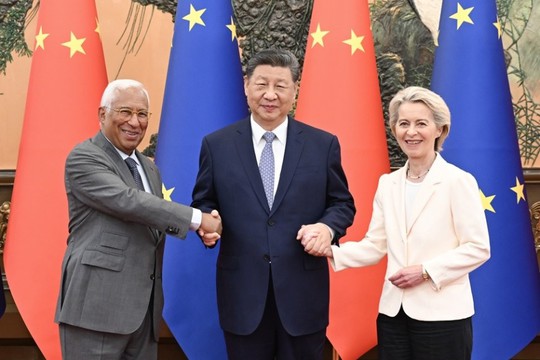Chinese President Xi with President of the European Council Antonio Costa and President of the European Commission Ursula von der Leyen.
Photo: Xinhua
President Xi Jinping on Thursday said China and the EU, both “big guys” in the international community, should work together to keep their bilateral relationship growing in the right direction. President Xi made the remarks while meeting with President of the European Council Antonio Costa and President of the European Commission Ursula von der Leyen, who are in Beijing for the 25th China-EU Summit.
When EU leaders meet Chinese President Xi Jinping this week, they intend to make his support for Russia a pivotal topic. “China is de facto enabling Russia’s war economy. We cannot accept this... How China continues to interact with Putin’s war, will be a determining factor for EU-China relations going forward,” European Commission president Ursula von der Leyen said on July 8. She hopes to put pressure on Beijing to distance itself from Russia’s war in Ukraine and thus force Moscow to negotiate with Kyiv in good faith. The problem is that for more than three years, this approach hasn’t worked — and nothing suggests it will now, ‘The Financial Times’ notes.
Chinese Foreign Minister Wang Yi recently told EU officials that Beijing doesn’t want to see Russia lose in Ukraine. That should come as no surprise; it’s not in China’s interests to see its giant nuclear-armed neighbour destabilised.
Instead of taking China’s concerns into account, Europe has maintained a maximalist position. Its publicly declared goals envisage Ukraine’s return to its 1991 borders and the trial of Russian war criminals, including its most senior leaders — which hardly signals to Beijing that the EU is serious about a negotiated resolution that the Kremlin could live with.
Moreover, China believes that even if it did put pressure on the Kremlin, it would get no material incentives from the west in exchange. The EU’s de-risking strategy, driven by genuine concerns about overdependency on China, will not go away, and nor will US restrictions aimed at stifling Beijing’s technological ambitions as the AI race heats up. Fierce western criticism of Beijing’s support for Moscow has been accompanied by a more muted reaction to India dramatically increasing its purchases of Russian oil and thus providing a lifeline for the Russian wartime economy — prompting China to conclude that Europe and America are hypocritical.
In the fourth year of the war, any hopes that Russia could be defeated outright are long gone. Western goals are more modest: ensuring that Ukraine survives as an independent state. Beijing isn’t opposed to that, but with Putin refusing to back down, a mercurial Donald Trump in the White House, and Europe showing no signs of going soft on China economically, Beijing sees no incentive to change course. Moreover, it has a vital interest in strengthening a partnership with.
China isn’t very impressed by the coercive tools that Europe is trying to deploy, such as the most recent sanctions. Beijing has demonstrated its ability to create adaptable infrastructure designed to support Russia. New EU restrictions against two regional banks will only cement their role as the Chinese government’s specialised tools for trade with Moscow. China has also shown it can retaliate effectively, and its ability to leverage western dependency on critical minerals has only boosted Beijing’s confidence. China could also go after the supply chains of Ukrainian drone manufacturers, which heavily rely on Chinese components.
China won’t dump Russia and making frustration over that reality one of the organising principles of Europe’s China policy won’t help — even if Brussels continues to call out Beijing for moralistic reasons.
read more in our Telegram-channel https://t.me/The_International_Affairs

 9:58 26.07.2025 •
9:58 26.07.2025 •























